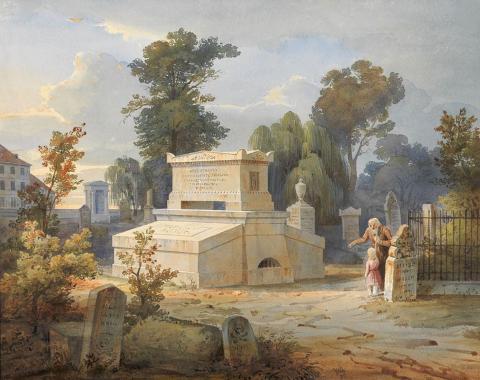Chinese practice
蓋棺論定;鹿死誰手
do not judge ‘til the coffin lid is lowered;

Photo: Wikimedia Commons
照片:維基共享資源
to whom the deer falls
(gai4 guan1 lun4 ding4; lu4 si3 shei2 shou3)
明代官員呂坤(西元一五三六~一六一八年)的墓誌銘中,有這麼一段:「有善惡在我,毀譽由人,蓋棺定論,無借於子孫之乞言耳」(我一生中的行為無論好壞,都是我所做的;我的聲譽和他人對我的看法,就讓別人去說。現在棺材蓋上,就下了結論,沒什麼可再說的了。我不需要子孫去向別人乞求理解我的作為。)
這段話的意義深刻,意思是說我們不該在人的一生結束前去評斷他們,而且一旦棺材蓋上,也就沒有什麼餘地再去做什麼了。反過來,這也是在說,只有在人最終安息後,我們才有辦法完全評斷這個人,無論是好是壞。每個人都有可能做大事、行良善,但也同樣有可能為非作歹。
我們此處所聚焦的部分是「蓋棺定論」──意指現在棺材已蓋上了,已沒什麼可說的了──此語稍經變化,即為現今所使用的成語「蓋棺論定」。
呂坤這段話,或許是受到的唐代詩人杜甫(西元七一二~七七○年)的啟發。杜甫被尊稱為「詩聖」,他在〈君不見簡蘇徯〉一詩中寫道:
丈夫蓋棺事始定,
君今幸未成老翁,
何恨顦顇在山中。
「蓋棺論定」的概念,在呂坤的墓誌銘中,是以終點的角度回顧一生──已無未竟之事,因此已可做出評斷。而杜甫的這首詩,則是由活著的角度來看待人的一生──只要人還活著,都還有機會,仍有無限的可能。
成語「蓋棺論定」也可以用來表示已對事情做出決定,或者事情已經了結。
一九七六年三月十日的《達拉斯晨報》報導,美國德州理工大學球評洛夫‧卡本特,描述當晚的比賽戰況有多麼緊繃,他說:「the opera ain’t over until the fat lady sings」(胖女士還沒唱歌,歌劇還沒結束呢)。這是在指理察‧華格納的歌劇《尼布龍根的指環》系列最後一部《諸神的黃昏》的結尾,扮演女武神布琳希德的歌劇演唱家在最後一幕長達二十分鐘的演唱,布琳希德一角傳統上是由身材較胖的女高音所擔綱演出。《諸神的黃昏》的劇情,是描述北歐神話中諸神的沉淪。對劇中諸神來說,當這位胖女士唱起歌來,就表示一切真的都結束了。
卡本特這句話,給了我們或可相當於「蓋棺論定」的英文說法:「It ain’t over ’til the fat lady sings」(胖女士唱歌之前,一切都還沒結束)。但這句英文比較是指情況不分軒輊,直到最後一刻都還可能有不同的發展。
或許「It ain’t over ’til the fat lady sings」的用法,更接近成語「鹿死誰手」。此語出自《晉書‧石勒載記》(晉朝的年代為西元二六五~四二○年):「脫遇光武,當並驅於中原,未知鹿死誰手」。
「中原」指的是黃河中下游地區,此為古中國文化的主要所在地。「鹿」是王位的象徵,因此「逐鹿」(獵鹿)即指追求王位,掌控王國或帝國。成語「逐鹿中原」即源於此,意思是「試圖奪取王位」。
因此,在比賽結束後問「鹿死誰手」,也就是問「誰是勝利者」?
(台北時報林俐凱譯)
這場選戰風起雲湧、瞬息萬變,到底鹿死誰手,還不到蓋棺論定的時候。
(This election campaign has been a rollercoaster ride, it’s going to go right down to the wire before we’ll know who is going to win.)
英文練習
it ain’t over ‘til the fat lady sings
An inscription on the tomb of the Ming Dynasty official Lu Kun (1536-1618) contains the line 善惡在我,毀譽由人,蓋棺定論,無藉於子孫之乞言耳 (My actions in life, good or bad, were down to me; my reputation, and what people thought of my actions, was down to others. The coffin lid now closed, there is nothing more to say. My descendants can make of them what they will).
It is a profound thought, that a person should not be judged until their life has come to an end, and that nothing else is to be done once the coffin lid is closed. The converse of this is perhaps that one cannot fully judge a person, for good or ill, until they are finally laid to rest. Everyone has the potential to do great things and great kindnesses, just as they have the potential to do wrong.
For our purposes here, the pertinent phrase is 蓋棺定論 (the coffin lid now closed, there is nothing more to say), as it has come down to us, albeit slightly altered, as the idiom 蓋棺論定.
Lu was perhaps inspired by the poem Haven’t You Seen?: A Note to Su Xi by the Tang Dynasty “poet sage” Du Fu (712-770AD), in which he writes:
When a real man is in his coffin only then is the reckoning settled, (蓋棺事始定)
and you now are fortunate not yet to be an old man,
what resentment makes you look so worn down here in the mountains?
In Lu Kun’s inscription, the idiom is used from the perspective of looking back on a concluded life, with the idea that nothing else is to be done, and it is to be judged accordingly. In the poem, Du Fu is looking at the person’s life from the perspective of the living, where there is still much potential to fulfill.
The idiom 蓋棺論定 can also be used to mean that an issue has been decided upon, or that a case has been closed.
According to the Dallas Morning News of March 10, 1976, Texas Tech University sports commentator Ralph Carpenter, talking about how tight the game that night was, said, “the opera ain’t over until the fat lady sings.” This was a reference to the opera singer performing the role of the valkyrie Brunnhilde in the 20-minute farewell scene of Gotterdammerung, the last part of Richard Wagner’s opera cycle Der Ring des Nibelungen. Brunnhilde is traditionally played by a rather large lady; Gotterdammerung is about the end of the world of the Norse gods. For the gods, then, it really is over when the fat lady sings.
Carpenter’s turn of phrase gave us a possible English equivalent to 蓋棺論定: “It ain’t over ’til the fat lady sings.” Unlike the Chinese idiom, the English phrase simply refers to something being too close to call, something that may go either way until the very end.
Perhaps the English phrase is closer in usage to the idiom 鹿死誰手 (to whom the deer falls), from Records of Shi Le in the Book of Jin, the official history of the Jin Dynasty (265 to 420AD), which contains the sentence 脫遇光武,當並驅于中原,未知鹿死誰手 (Had I come across Emperor Guangwu [founder of the Later Han Dynasty] I would have fought with him for control of the Central Plains; who knows to whom the deer would have fallen?)
The 中原 (Central Plains) represented the area in the middle and lower regions of the Yellow River, the seat of mainstream ancient Chinese culture. The deer (鹿) was a symbol of the throne; hunting the deer, therefore, meant pursuing the throne and, by extension, control over the kingdom or empire. This is also the origin of the idiom 逐鹿中原 (hunting deer in the Central Plains), meaning “to attempt to seize the throne.”
(Paul Cooper, Taipei Times)
It’s been tough, and we’ll have to give it everything if we’re going to succeed, but I refuse to admit defeat until the very end. Remember, it ain’t over ‘til the fat lady sings.
(上半場我們打得很辛苦,如果我們要贏,一定要全力以赴,不到最後一刻,我不會認輸。你要知道,比賽還沒結束,鹿死誰手還很難講。)

A: In addition to “Mission: Impossible 8,” what other new movies are in theaters? B: “Final Destination: Bloodlines” and “The Wedding Banquet” are out. The French film “Jane Austen Wrecked My Life” will also open soon. A: The Final Destination horror movie series is so scary that I don’t dare watch it. B: Then how about “The Wedding Banquet,” which is a 2025 remake of the 1993 classic of the same title? Oscar-winning actress Youn Yuh-jung’s performance in it is highly anticipated. A: But as a fan of British writer Jane Austen, I’m more interested to see how her works

The deep waters off the coast of California are home to a bizarre creature: the flapjack octopus. This creature, known for its pancake-like appearance, spreads itself thin on the seabed as a clever survival strategy, making it difficult for predators to spot and capture it. With its unique, umbrella-shaped body formed by webbed arms, the flapjack octopus moves through the water in a graceful manner. It propels itself forward by rhythmically moving its body and contracting its webbed arms. Its pair of ear-like fins, which move independently yet with remarkable coordination, also help it explore the deep-sea environment. These

Bilingual Story is a fictionalized account. 雙語故事部分內容純屬虛構。 I stand by the Miluo River as dusk falls. The court betrayal is too much. I served Chu with loyalty. I forged alliances and fought corruption. But the whispers of jealous courtiers, the murmurs of treason, spoke louder. The king cast me out. The water looks calm. It promises peace. I step in. The river is cold against my legs. I hear shouts behind me — fishermen calling my name. I keep walking. The calls grow louder, but I do not turn around. The water rises to my chest. It pulls at me. I

Continued from yesterday(延續自昨日) https://www.taipeitimes.com/News/lang Many people may be familiar with flapjack octopuses thanks to Pearl, a charming character from the Pixar film Finding Nemo. However, her portrayal presents several scientific inaccuracies. In reality, flapjack octopuses are deep-sea creatures, which are unsuitable for the brightly lit shallow reef environment depicted in the film. Their primary defense mechanism relies on their reddish coloration, which would be ineffective in the well-lit shallows. Pearl’s famous line, “You guys made me ink,” is another fictional detail that is not consistent with the observed actions of real flapjack octopuses. As common as it is in many other octopus